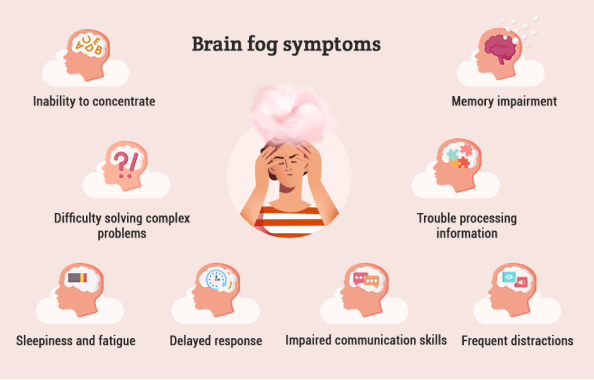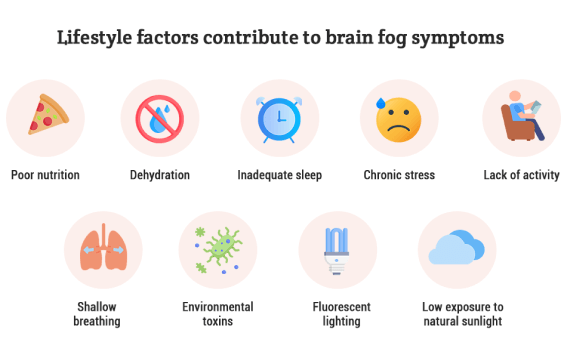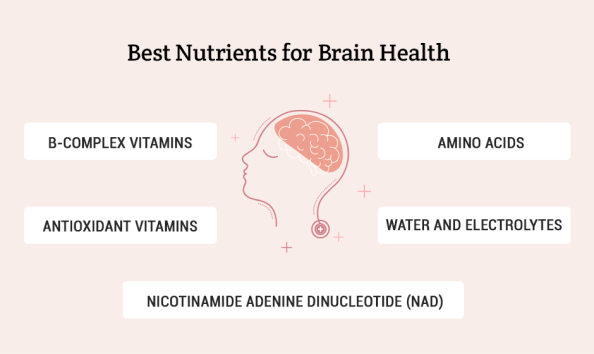
In today’s tech-centric economy, the ability to quickly and accurately process information and make informed decisions is a key career asset. But the downside of working in the information age is poor health, brought on by too much sitting, poor sleep habits and on-the-go meals that satisfy hunger without meeting nutritional needs. Add chronic stress to the mix, and your health takes a nosedive while your cognitive performance falters.
Vitamin IV therapy provides a quick and effective solution for revitalizing your health and combating brain fog from nutrient deficiency. Learn how high-potency vitamins delivered intravenously can help you detox brain fog and boost your energy for peak performance.
What Causes Brain Fog?
Brain fog is a catch-all term for a number of symptoms that interfere with cognitive function. Brain fog symptoms include:
- Inability to concentrate
- Difficulty solving complex problems
- Trouble processing information
- Memory impairment
- Sleepiness and fatigue
- Impaired communication skills
- Delayed response time
- Frequent distractions

In most cases, multiple lifestyle factors contribute to brain fog symptoms. Among the most common are:
- Poor or inadequate nutrition
- Dehydration
- Inadequate sleep
- Chronic stress
- Lack of physical activity
- Shallow breathing
- Environmental toxins
- Fluorescent lighting
- Low exposure to natural sunlight

By making basic lifestyle changes, you can detox brain fog and boost your cognitive performance while revitalizing your overall health.
Vitamin IV Therapy for Brain Fog
Good nutrition is foundational to optimal physical and mental health and performance. Your brain cells are literally made from nutrients found in the foods you eat. A plant-based low carbohydrate diet with a variety of fruits and vegetables, along with high quality protein from meat, fish and eggs, provides the nutrients you need for optimal brain health.
Unfortunately, modern lifestyles are not always conducive to good nutrition, which is why nutrient supplements are necessary. However, oral supplements lose much of their potency during the digestion process, and some go right through your system without ever being absorbed.
Intravenous vitamin therapy delivers high-potency vitamins, minerals, enzymes and amino acids directly to your bloodstream, completely bypassing your GI tract. Once infused, nutrients are quickly carried to cells throughout your body, where they can get to work to optimize your health.
Best Nutrients for Brain Health

Some of the best nutrients for brain health include:
-
Nicotinamide Adenine Dinucleotide (NAD)
NAD plays multiple key roles in every cell in your body, including your brain. It works to repair DNA, support energy metabolism, boost immune function and fight aging at the cellular level. NAD reserves diminish as you age, and many people are NAD deficient. Low NAD has been linked to neurodegenerative brain and nervous system disorders like dementia and Parkinson’s disease.
-
B-Complex Vitamins
B Vitamins are critical for brain function, and they play multiple key roles in a vast array of chemical reactions and biological processes in every bodily system. B vitamins are water soluble, meaning you can’t store them, so you need to get them from foods and supplements on a regular basis.
-
Antioxidant Vitamins
Antioxidants are crucial for combatting stress and mental fatigue, and for maintaining healthy vibrant cell membranes. They also play a key role in immune function. A brain tonic IV delivers potent antioxidants and B vitamins to keep your brain sharp and focused.
-
Amino Acids
As the building blocks of tissues, amino acids are foundational for cellular health throughout your body. They also play key metabolic roles. For example, the amino acid hemoglobin is a vital component of red blood cells that allows oxygen to be carried to cells throughout your body. Your brain cannot perform properly when oxygen levels are low. Amino acid IV therapy supplies the full spectrum of essential amino acids to optimize cellular health.
-
Water and Electrolytes
Many people don’t think of water as a nutrient, but it is perhaps the most important brain nutrient of all. Your brain tissue is 75% water, and without water, you will quickly die in a matter of days. Nevertheless, many people are chronically dehydrated, which contributes significantly to brain fog. IV hydration therapy helps you quickly rehydrate, and it replenishes key electrolytes that your brain depends on for survival.
Get the Best Vitamin IV Therapy for Brain Fog in NYC
Many clinics offer intravenous vitamin therapy, but nutrient potency and quality of care can vary greatly from one provider to the next. When it comes to infusing nutrients directly into your bloodstream, you want the highest quality products, delivered safely by a professional clinician.
At InVita Wellness, we offer high-grade nutrient IV cocktails in a clean and relaxing spa-like setting. After careful pre-screening, our professional technicians ensure that your IV is set up correctly, and go out of their way to make sure your visit is pleasant and comfortable.
If you are feeling tired, run down and find it hard to concentrate, vitamin IV therapy for brain fog could be the solution you need to get you back on track. Contact InVita Wellness today, and get the nutrients you need for peak cognitive performance and brain health.